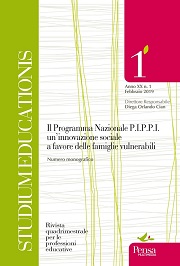The collaboration between research and professional practices for social innovation: the territorial laboratories in the perspective of the Activity Theory
Abstract
Social innovation, one of the main references of contemporary European policies, is a tool to design and implement new organizational and institutional models to contrast poverty and
vulnerability and to promote practices of inclusion and active participation of citizens in the construction of new social policies. The literature on the subject underlines the need for the
connection between research, practice, and policy making in the production of effective social innovation. In this perspective, research is conceived not as a process that “uses” professional
practices to elaborate its own theories, but as a participatory learning path that produces an impact that is concrete and appropriate to the needs of the context.
The activity theory is a particularly effective framework to analyze this process, addressing the issues of community, professional cultures and artifacts, also seen in the dynamic perspective of
learning and changing the patterns of meaning and practices of the actors and institutions involved.
The article discusses the risks associated with a neoliberal conception of social innovation, placing the burden entirely on intermediate bodies, and describes the practice of Territorial Laboratories (LabT) born as a development of the P.I.P.P.I. ministerial program, proposing to use the Theory of Activity as a theoretical framework to understanding the relationships between
research, practice and policy making.


